
Exposé Online
What's old
Exposé print issues (1993-2011)
- 1 (October 1993)
- 2 (February 1994)
- 3 (May 1994)
- 4 (August 1994)
- 5 (October 1994)
- 6 (March 1995)
- 7 (July 1995)
- 8 (November 1995)
- 9 (March 1996)
- 10 (August 1996)
- 11 (February 1997)
- 12 (May 1997)
- 13 (October 1997)
- 14 (February 1998)
- 15 (July 1998)
- 16 (January 1999)
- 17 (April 1999)
- 18 (November 1999)
- 19 (May 2000)
- 20 (October 2000)
- 21 (March 2001)
- 22 (July 2001)
- 23 (December 2001)
- 24 (April 2002)
- 25 (September 2002)
- 26 (February 2003)
- 27 (August 2003)
- 28 (December 2003)
- 29 (April 2004)
- 30 (September 2004)
- 31 (March 2005)
- 32 (September 2005)
- 33 (May 2006)
- 34 (March 2007)
- 35 (January 2008)
- 36 (October 2008)
- 37 (July 2009)
- 38 (July 2010)
- 39 (Summer 2011)
Features
Putting the ‘Harm’ in Charming —
A Profile of Charming Hostess

Band names can be misleading. Charming Hostess is definitely an inviting and feminine moniker, but also one that might conjure up an image of some superficial-light-polite-foo-foo music. Maybe something to listen to while sipping a Day-Glo colored mixed drink through a straw from a curvy fish-bowl-looking glass with a little paper umbrella in it and a miniature plastic monkey hanging from the side by its tail? Hell no! “We put the ‘Harm’ in Charming and the ‘Ho’ in Hostess,” commented one-time Hostess Nina Rolle.
by Mike Grimes, Published 2005-09-01
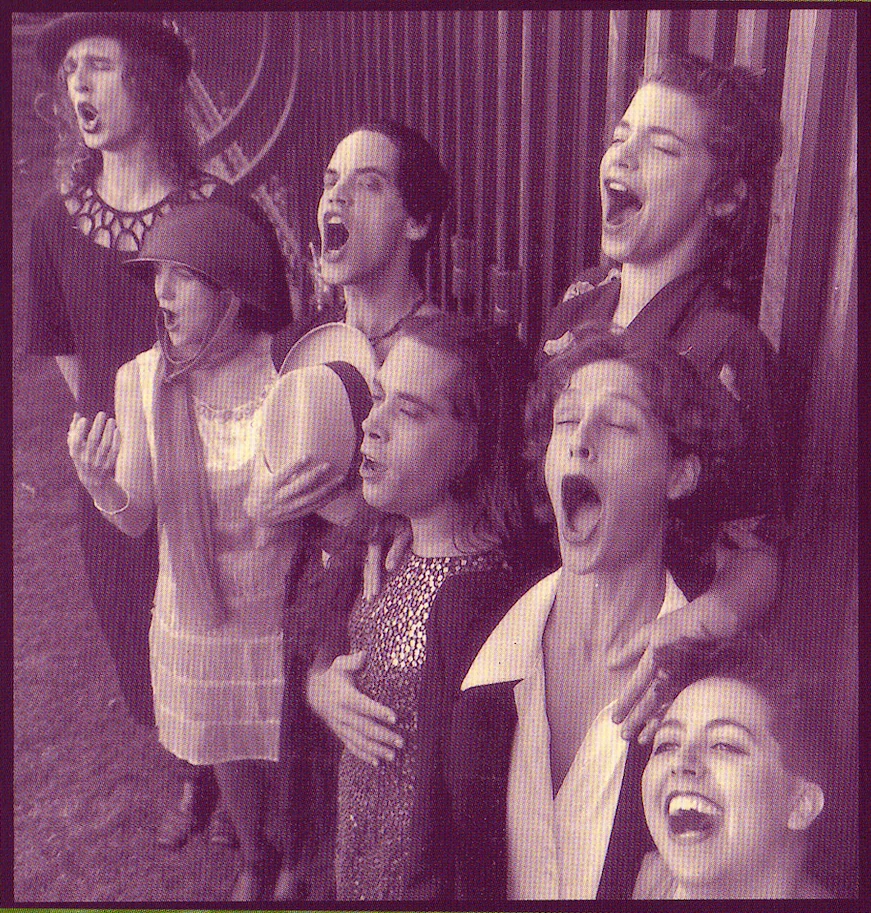 Though Nina’s description is apt, it’s too narrow to give these talented musicians the credit they deserve. Like any good hostess, this group is capable of many different expressions but, perhaps unlike a hostess, their music is anything but shallow. As Head Hostess Jewlia Eisenberg puts it, “[my] music lives where Jewish and African diasporas collide, incorporating Judeo-Arabic praise songs and Pygmy counterpoint, doo-wop and Yiddish nigunim, field hollers and Torah chanting.” To put it mildly, that’s a pretty big musical house. Though “World Music” may be fashionable these days, don’t confuse Charming Hostess with any of the many lame “New Age” poser outfits with a non-Western instrument or two thrown into the mix that are boring people on seven continents. They’re not faking. They sing well in several languages, play solidly across changing complex time signatures, and have tight arrangements with good grooves throughout. For them to employ musical styles from traditional Balkan folk to American country from song to song is typical. Throughout all these diverse musical forms, prominent multi-part harmony female vocals are the thread of continuity that ties the stylistically varied songs together.
Though Nina’s description is apt, it’s too narrow to give these talented musicians the credit they deserve. Like any good hostess, this group is capable of many different expressions but, perhaps unlike a hostess, their music is anything but shallow. As Head Hostess Jewlia Eisenberg puts it, “[my] music lives where Jewish and African diasporas collide, incorporating Judeo-Arabic praise songs and Pygmy counterpoint, doo-wop and Yiddish nigunim, field hollers and Torah chanting.” To put it mildly, that’s a pretty big musical house. Though “World Music” may be fashionable these days, don’t confuse Charming Hostess with any of the many lame “New Age” poser outfits with a non-Western instrument or two thrown into the mix that are boring people on seven continents. They’re not faking. They sing well in several languages, play solidly across changing complex time signatures, and have tight arrangements with good grooves throughout. For them to employ musical styles from traditional Balkan folk to American country from song to song is typical. Throughout all these diverse musical forms, prominent multi-part harmony female vocals are the thread of continuity that ties the stylistically varied songs together.
For nearly a decade Charming Hostess has been creating music showcasing various female vocal traditions from around the world under Jewlia’s direction and vision. The band came together as a result of collaborations between a group of female vocalists and dancers and three of the four members of Idiot Flesh. Both these sets of musicians have ties to the (in)famous Barrington Hall co-op on the campus of U.C. Berkeley. Barrington, Jewlia reveals, “was a community of ideas, art, and social change. And it was also a very fertile musical environment. Acid Rain, Idiot Flesh, Sleepytime [Gorilla Museum] started there, so did Charming Hostess, King Beaver, and 501 Spanish Verbs.” The socially conscious environment of the co-op certainly contributed to the band’s sharp political and philosophical slant. Interestingly, Barrington Hall was later shut down ostensibly due to involvement in the organizing of a large Sproul Plaza “smoke-in” demonstration that allegedly was the largest event there of the entire semester! After the house was shut down, Jewlia says, “the [Barrington] community fled to industrial West Oakland, where housing was cheap and you could rock out without bothering your neighbors.” And rock out they have…
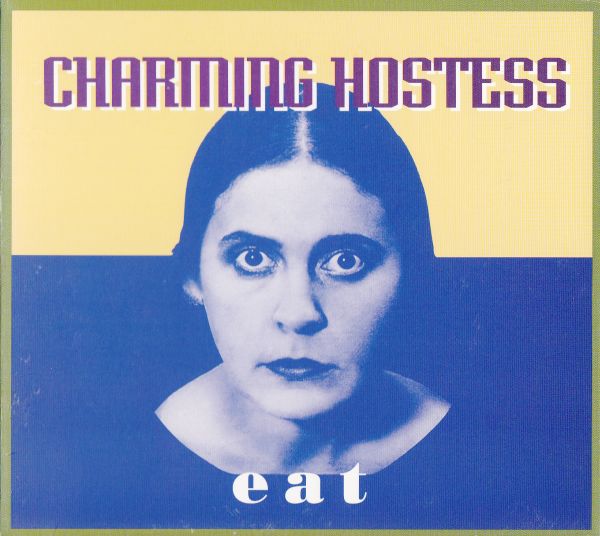 Charming Hostess has technically released three albums: Eat (1999), Sarajevo Blues (2004), and Punch (2005). However, Jewlia’s solo album Trilectic (2001) should also be grouped along with these since it prominently features most of the original Charming Hostess members, is definitely similar in vocal structure and style, and marks an important transition between the “old” and “new” versions of the group. Actually, Trilectic is subtitled as a Charming Hostess release on the inside booklet. The original Barrington Big Band version of Charming Hostess played together for a few years before releasing their debut album. Featuring original tunes interspersed with a Residents cover, Deep South American works, and traditional Bulgarian, Turkish, Hungarian, Ladino, Yiddish texts and songs, Eat obviously covers a lot of musical terrain, though the sonic basis for the material definitely remains rooted in rock. Jewlia leads a barrage of vocals that include traditional singing, breathing, yelling, and whispering. The Idiot-provided musical accompaniment is stark and angular. Sometimes the music is klezmer, sometimes punk rock, sometimes neither. Many songs interlace intricate and complex three-part vocal harmonies often related to each other in ways that would surely shock your average college harmony-voicing instructor. The tunes are at times soothing and at times downright frightening.
Charming Hostess has technically released three albums: Eat (1999), Sarajevo Blues (2004), and Punch (2005). However, Jewlia’s solo album Trilectic (2001) should also be grouped along with these since it prominently features most of the original Charming Hostess members, is definitely similar in vocal structure and style, and marks an important transition between the “old” and “new” versions of the group. Actually, Trilectic is subtitled as a Charming Hostess release on the inside booklet. The original Barrington Big Band version of Charming Hostess played together for a few years before releasing their debut album. Featuring original tunes interspersed with a Residents cover, Deep South American works, and traditional Bulgarian, Turkish, Hungarian, Ladino, Yiddish texts and songs, Eat obviously covers a lot of musical terrain, though the sonic basis for the material definitely remains rooted in rock. Jewlia leads a barrage of vocals that include traditional singing, breathing, yelling, and whispering. The Idiot-provided musical accompaniment is stark and angular. Sometimes the music is klezmer, sometimes punk rock, sometimes neither. Many songs interlace intricate and complex three-part vocal harmonies often related to each other in ways that would surely shock your average college harmony-voicing instructor. The tunes are at times soothing and at times downright frightening.
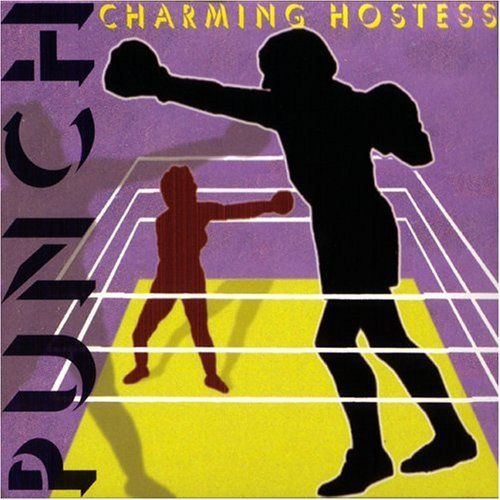 Following the release of Eat, the band began recording material that would ultimately be released as Punch. The music on Punch is a logical extension of many of the ideas and style the band started on Eat. The arrangements are perhaps a little more polished on Punch and an even wider variety of musical instruments are used. Despite being a strong follow-up effort, the commercial release of Punch was oddly sidetracked for a few years as the band began a metamorphosis around the year 2000. In fact, it actually was released after Sarajevo Blues despite being recorded prior. Part of the delay with Punch, Jewlia recalls, was that “it took a long time to figure out who would put it out, and then Chris Cutler liked it so it came out on ReR. Then the graphics took a while, but it was worth it. They are slammin’.” Other projects also materialized. Around the time Eat was released, new band Sleepytime Gorilla Museum was launched by three Hostesses — former Idiots Dan Rathbun and Nils Frykdahl, and Carla Kihlstedt.
Following the release of Eat, the band began recording material that would ultimately be released as Punch. The music on Punch is a logical extension of many of the ideas and style the band started on Eat. The arrangements are perhaps a little more polished on Punch and an even wider variety of musical instruments are used. Despite being a strong follow-up effort, the commercial release of Punch was oddly sidetracked for a few years as the band began a metamorphosis around the year 2000. In fact, it actually was released after Sarajevo Blues despite being recorded prior. Part of the delay with Punch, Jewlia recalls, was that “it took a long time to figure out who would put it out, and then Chris Cutler liked it so it came out on ReR. Then the graphics took a while, but it was worth it. They are slammin’.” Other projects also materialized. Around the time Eat was released, new band Sleepytime Gorilla Museum was launched by three Hostesses — former Idiots Dan Rathbun and Nils Frykdahl, and Carla Kihlstedt.
Jewlia was also transitioning musically during this time. “Already we were immersed in politics, already we were engaged in multiple diasporas, and already women’s voices were at the heart of my work,” she points out. “Then John Zorn asked me to score a work for a cappella female voices. At first I viewed this as restrictive — but soon I was amazed at the world I found. My writing shifted. It still had eerie harmonies and skittery beats, but I was also getting into these pointillist and minimalist gestures, lots of texture based on breath, longer development, and a wider emotional range. Rhythms were now based on the body, repetitions seemed physically determined. Most importantly, working with only voices was forcing me to go deeper into text.” Using primarily texts taken from and based on the philosophy and sexuality of early 20th Century radical Jews Walter Benjamin and Asja Lacis, this new songwriting approach was revealed on Trilectic. Though the album is almost entirely a cappella, the many voices provide the melody, chordal harmony, rhythm, and atmosphere. And the songs still definitely contain a high degree of harmonic complexity and sonic density, despite a lack of significant backing instrumentation.
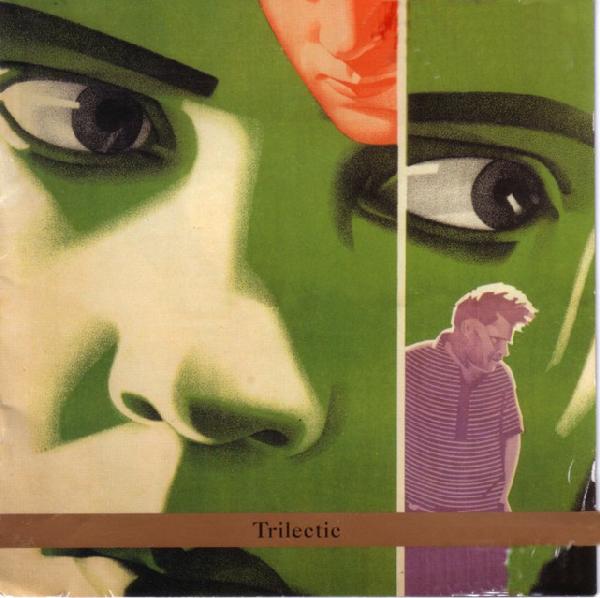 After the release of Trilectic, a wholesale band line-up change ensued. The Charming Hostess Big Band line-up was shelved and Jewlia began working with vocalist / cellist Marika Hughes and vocalist Cynthia Taylor. “I met Marika through the Oaktown bad-ass musician network, and she introduced me to Cyn,” Jewlia recalls. “They both bring different and amazing things to the table musically — Marika is a classically trained cellist, Cyn comes out of the blues and jazz tradition. Both of them sing with a lot of depth and emotion, are very thoughtful about diaspora consciousness, and are deeply committed to the politics of the music.” This streamlined-but-still-powerful new Charming Hostess released their first album together Sarajevo Blues last year. It continues the strong a cappella style from Trilectic but adds more instruments back into the fold and extends the boundaries of a cappella music even further than its predecessor. Jewlia is pleased with the complementary nature of the current vocal trio and the varied elements each person contributes. “Completely aside from technique or range, each voice has something emotionally / spiritually unique to offer — that's the magic of the voice as opposed to all other instruments. The voice reveals the soul, if allowed to do so. As for style and tools — Cynthia has a dramatic style, Marika's is very straightforward, and I am shifty — sometimes aggressive, sometimes sweet, sometimes whispered or screamed. I am most likely to use what is pretentiously referred to as ‘extended vocal technique,’ Cynthia is most likely to look for tools [from] the American popular song tradition, Marika is most likely to use classical or jazz ideas.”
After the release of Trilectic, a wholesale band line-up change ensued. The Charming Hostess Big Band line-up was shelved and Jewlia began working with vocalist / cellist Marika Hughes and vocalist Cynthia Taylor. “I met Marika through the Oaktown bad-ass musician network, and she introduced me to Cyn,” Jewlia recalls. “They both bring different and amazing things to the table musically — Marika is a classically trained cellist, Cyn comes out of the blues and jazz tradition. Both of them sing with a lot of depth and emotion, are very thoughtful about diaspora consciousness, and are deeply committed to the politics of the music.” This streamlined-but-still-powerful new Charming Hostess released their first album together Sarajevo Blues last year. It continues the strong a cappella style from Trilectic but adds more instruments back into the fold and extends the boundaries of a cappella music even further than its predecessor. Jewlia is pleased with the complementary nature of the current vocal trio and the varied elements each person contributes. “Completely aside from technique or range, each voice has something emotionally / spiritually unique to offer — that's the magic of the voice as opposed to all other instruments. The voice reveals the soul, if allowed to do so. As for style and tools — Cynthia has a dramatic style, Marika's is very straightforward, and I am shifty — sometimes aggressive, sometimes sweet, sometimes whispered or screamed. I am most likely to use what is pretentiously referred to as ‘extended vocal technique,’ Cynthia is most likely to look for tools [from] the American popular song tradition, Marika is most likely to use classical or jazz ideas.”
Putting other writers’ words to music has always been one of the strengths of Charming Hostess. How does Jewlia do it? She starts with the desired text and writes / arranges music around it. It’s a dynamic and involved process, she explains: “Music is in conversation with text — but how does music affect the reproduction of meaning? Does music change words in the same way a translation changes even the language one is translating into? How do I give [a] musical voice to the non-verbal languages — visual, spatial, emotional, or gestural — found in cities, or bodies? These are the issues to grapple with when working with text.”
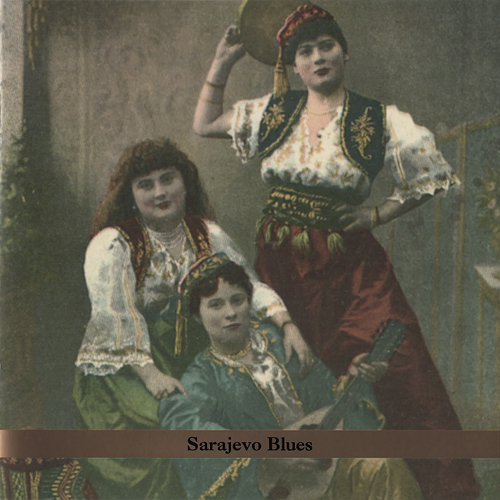 Most of the Sarajevo Blues lyrics are translated texts written by dissident Bosnian poet Semezdin Mehmedinovic from a collection not coincidentally also entitled Sarajevo Blues. Jewlia first met Sem at a Berkeley bar after Eat was released and she was subsequently motivated to read some of his poetry. Immediately after reading Sem’s Sarajevo Blues collection, Jewlia knew this work would be an ideal text source for an album. After Trilectic was released, she sent the CD to Sem along with a note asking about the possibility of using his material as the basis of her next album and he enthusiastically supported the idea. The resulting album is a marriage of different cultures and interpretations. One of the most striking songs on Sarajevo Blues is the song “Death Is a Job.” The music is one of the simpler arrangements on the album and is reminiscent of 60s doo-wop vocal bands. On top of these pleasant melodies, the vocals tell a grim tale about how photographers benefited in Sarajevo by taking pictures of victims of sniper attacks and point out the absurdity of, and humanitarian conflict of interest in, that situation. While many songs chronicle the brutalities of war, others demonstrate the wide range and depth of emotions and thoughts that go on despite the constant violence — from the joys of watching children sledding to the simple pleasures of relationships. Sem, by the way, loves the final product and is impressed with its harmonization of American and Bosnian forms.
Most of the Sarajevo Blues lyrics are translated texts written by dissident Bosnian poet Semezdin Mehmedinovic from a collection not coincidentally also entitled Sarajevo Blues. Jewlia first met Sem at a Berkeley bar after Eat was released and she was subsequently motivated to read some of his poetry. Immediately after reading Sem’s Sarajevo Blues collection, Jewlia knew this work would be an ideal text source for an album. After Trilectic was released, she sent the CD to Sem along with a note asking about the possibility of using his material as the basis of her next album and he enthusiastically supported the idea. The resulting album is a marriage of different cultures and interpretations. One of the most striking songs on Sarajevo Blues is the song “Death Is a Job.” The music is one of the simpler arrangements on the album and is reminiscent of 60s doo-wop vocal bands. On top of these pleasant melodies, the vocals tell a grim tale about how photographers benefited in Sarajevo by taking pictures of victims of sniper attacks and point out the absurdity of, and humanitarian conflict of interest in, that situation. While many songs chronicle the brutalities of war, others demonstrate the wide range and depth of emotions and thoughts that go on despite the constant violence — from the joys of watching children sledding to the simple pleasures of relationships. Sem, by the way, loves the final product and is impressed with its harmonization of American and Bosnian forms.
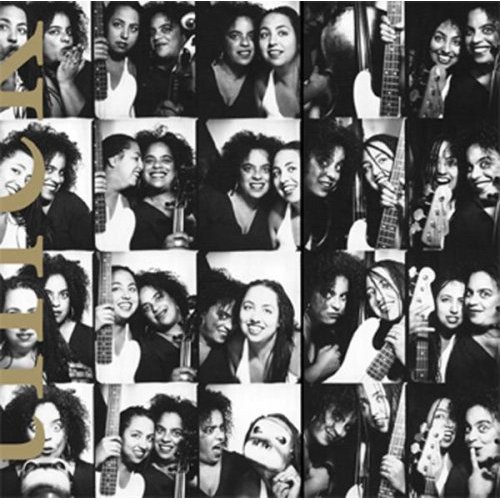 Charming Hostess continues to perform shows with the Sarajevo Blues line-up. When they’re not Charming Hostesses, Jewlia and Marika also perform with their pop-funk sounding band Red Pocket. Marika also plays with Two Foot Yard and Vienna Teng, while Cynthia runs a nonprofit called Oasis for Girls. What’s on the horizon for the band? Most likely — more new and interesting female vocal-centered music. So go ahead and toss out the rest of that bright blue drink. With the recent release of Punch, it also appears that a reunion concert with the original Charming Hostess Big Band will take place. “There's a lot of fluidity between the big and small ChoHo, both in terms of sound and personnel,” Jewlia remarks. “I love playing with whoever is around — all the Hos are great!”
Charming Hostess continues to perform shows with the Sarajevo Blues line-up. When they’re not Charming Hostesses, Jewlia and Marika also perform with their pop-funk sounding band Red Pocket. Marika also plays with Two Foot Yard and Vienna Teng, while Cynthia runs a nonprofit called Oasis for Girls. What’s on the horizon for the band? Most likely — more new and interesting female vocal-centered music. So go ahead and toss out the rest of that bright blue drink. With the recent release of Punch, it also appears that a reunion concert with the original Charming Hostess Big Band will take place. “There's a lot of fluidity between the big and small ChoHo, both in terms of sound and personnel,” Jewlia remarks. “I love playing with whoever is around — all the Hos are great!”
Filed under: Interviews, Issue 32
Related artist(s): Charming Hostess, Jewlia Eisenberg, Sleepytime Gorilla Museum, Carla Kihlstedt
What's new
These are the most recent changes made to artists, releases, and articles.
- Review: Sterbus - Black and Gold
Published 2026-03-03 - Release: Janel Leppin's Ensemble Volcanic Ash - Pluto in Aquarius
Updated 2026-03-02 15:06:51 - Release: Janel Leppin - Slowly Melting
Updated 2026-03-02 15:05:27 - Release: Alister Spence - Always Ever
Updated 2026-03-02 15:04:11 - Release: Let Spin - I Am Alien
Updated 2026-03-02 15:02:41 - Review: Falter Bramnk - Vinyland Odyssee
Published 2026-03-02 - Review: Exit - Dove Va la Tua Strada?
Published 2026-03-01 - Review: Steve Tibbetts - Close
Published 2026-02-28 - Release: We Stood Like Kings - Pinocchio
Updated 2026-02-27 19:24:02 - Release: Stephen Grew - Pianoply
Updated 2026-02-27 19:20:11 - Release: Thierry Zaboitzeff - Artefacts
Updated 2026-02-27 00:16:46 - Review: Kevin Kastning - Codex I & Codex II
Published 2026-02-27 - Release: Zan Zone - The Rock Is Still Rollin'
Updated 2026-02-26 23:26:09 - Release: The Leemoo Gang - A Family Business
Updated 2026-02-26 23:07:29 - Release: Ciolkowska - Bomba Nastoyashchego
Updated 2026-02-26 13:08:55 - Review: Immensity Crumb - Chamber Music for Sleeping Giants
Published 2026-02-26 - Release: The Gatekeepers - Diary of a Teenage Prophet
Updated 2026-02-25 15:55:58 - Review: Mars Lasar - Grand Canyon
Published 2026-02-25 - Listen and discover: Mordecai Smyth will not break your back
Published 2026-02-25
